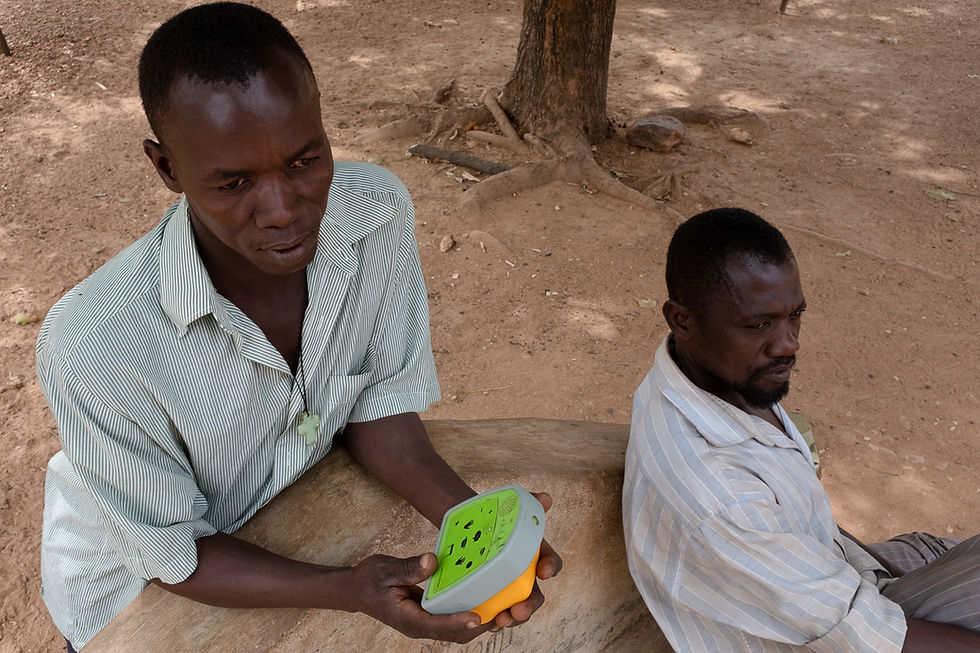Communication During a Public Health Crisis — Reaching Last-Mile Communities
- Erin Inclan

- Nov 9, 2021
- 3 min read
Updated: Feb 16, 2022

Photo: UNICEF Ghana
How do you reach and communicate with people with low- or zero-literacy skills who live in last-mile communities where there’s no infrastructure, electricity, or internet? How do you get your message across if they only speak a local language? This is a challenge under normal circumstances, but what happens in a pandemic?
In a video about communication during a public health crisis, Dena Morris, a member of Amplio’s governing board and Ghana Health Service staff shared their thoughts on using Talking Books for health education during the COVID-19 pandemic and beyond.
“Communication is the really first and most important thing to think about when a health crisis emerges because people are scared. There’s not an immediate understanding of what’s happening or how severe is the risk or how do I protect myself from that,” said Morris, an Amplio board member who led the Washington DC office of the Centers for Disease Control and Prevention, and is the former president and CEO of Washington Global Health Alliance.
“The Talking Book can be a particularly effective tool for responding to a health crisis because we’re able to fill that communications need quickly and effectively. We’re able to load the Talking Book with basic information—specialized, localized information—and we can do that in a way that amplifies the credibility of the people who are speaking.”
Watch a video about using the Talking Book for public health communication
In April 2020, when Amplio Ghana, Ghana Health Service, and UNICEF partnered to launch a rapid COVID-19 response campaign in the Upper West Region, the initiative made the news. UNICEF provided the loan of their Talking Book devices.
Our Ghana team worked with health experts and local leaders to produce audio content about COVID-19 symptoms, treatment, and safety, as well as meningitis information due to an outbreak in the region. Messages were recorded in four local languages. Talking Books were distributed to 207 Community-Based Health Planning and Services (CHPS) compounds and five community health volunteers (CHVs) per district.

CHPS community health nurses play Talking Book messages to support health education during ANC visits and child wellness clinics. Photo: UNICEF Ghana/Joseph Mills
From April to December, CHPS nurses played Talking Book messages during antenatal care and child wellness clinics. CHVs shared Talking Book messages during household visits. The Talking Book's built-in speaker helped to support social distancing. The team also distributed PPEs and sanitized the devices between uses. To reach more people, they attached battery-powered outdoor speakers to Talking Books to broadcast health messages in the markets and lorry stations.

The Talking Book speaker works for groups of about 20. You can also attach an external speaker for larger audiences and social distancing. Photo: UNICEF/Joseph Mills
“The Talking Book is context-specific. It is made to suit the community. It’s in language that the community members understand,” said Phoebe Balagumyetime, District Health Director, Nadowli/Kaleo District.
“What we’d like to be able to do is to affect behavior change without a health crisis,” Morris said. “We’d like to take the wealth of knowledge about how to prevent disease, how to prevent injury, and bring that to people in a way that persuades them to do things that are more likely to bring them a safer, healthier, more productive life.”
Balagumyetime agrees.
“We’re looking at issues of malaria. People still do not believe that malaria can cause a lot of deaths and children die every minute. (We’re) talking about tuberculosis, polio. I mean, we thought we were done with polio,” she said.
And that's exactly what we're doing. In 2022, the UNICEF CHPS project will expand to reach two more districts, Lambussie/Karni and Daffiama/Busie/Issa-DBI. In addition, Talking Books will be updated with new content to provide ongoing health education, including preventative care as well as messages to address emerging health issues.


